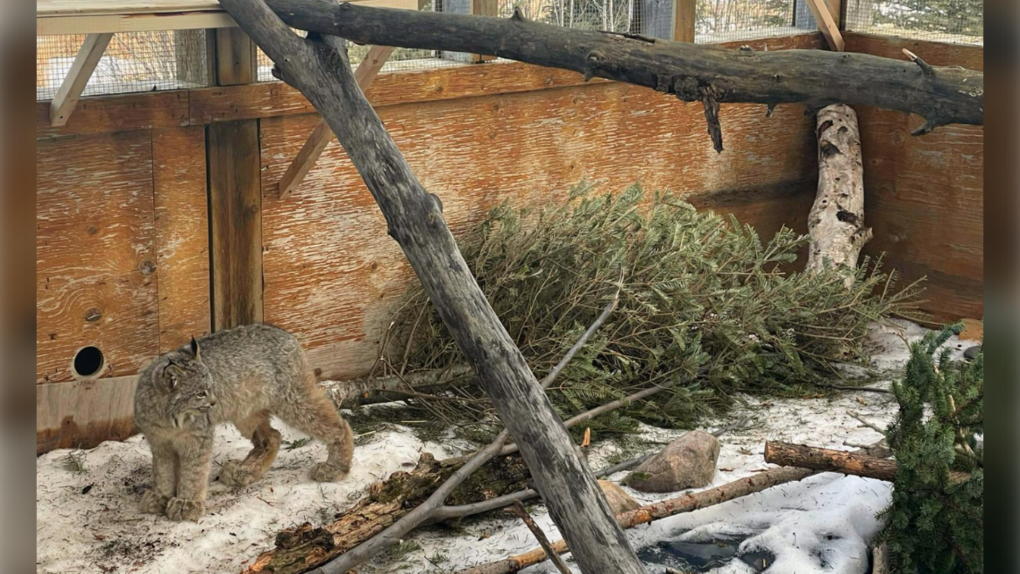Wild North rescues orphaned lynx cub near Drayton Valley
An orphaned lynx is getting some help surviving, thanks to an Alberta wildlife rehabilitation organization.
Last week, the Wild North Alberta wildlife rescue received a call from Fish and Wildlife that they had recovered a "unique animal."
"Some workers on a job site in Drayton Valley discovered a deceased lynx that had been hit by a vehicle on the road," explained Dale Gienow, the rescue's executive director.
The Fish and Wildlife officers found that two young kittens were lingering around their mother. One of the youngsters was successfully captured and brought to Wild North.
Typically, a young lynx stays with their mother until around 10 months old, at which point it would start to live by itself. This cub is around seven to eight months.
Gienow says efforts to locate the second kitten continue.
"[At that point] the survival rate for these guys would be pretty poor without mom, so we're very, very hopeful that they manage to capture the second sibling
In the meantime, Wild North's newest guest has been named Hunter, after the Edmonton Oilers mascot. She was slightly underweight and dehydrated, Gienow said, but is overall in "reasonable health."
"It'll never hear its name, but that's what we're calling it," Gienow added. "It's really important for us to maintain a healthy relationship with wild animals and is to say that we don't want them to get accustomed to us or over-socialized.
 Hunter the lynx plays in his enclosure at the Wild North (Supplied).
Hunter the lynx plays in his enclosure at the Wild North (Supplied).
"It's especially important when you're dealing with large carnivores, like a lynx," he said. "We have to be very careful that the animal doesn't see us, it doesn't hear us. We do our best to stay so it can't smell us."
Hunter will stay with the wildlife organization until the spring when it will be released back in the Drayton Valley area.
In 33 years of operation, Wild North has not taken care of a lynx, Gienow said.
"These guys are very reclusive," he added. "We don't come across them very often and they're top of the food chain, so not a lot of them compared to prey species that we might get a lot of."
"To put this in perspective, how rare this is, we receive about 3,500 patients every year."
CTVNews.ca Top Stories

LIVE B.C. seeks ban on using drugs in 'all public spaces,' shifting approach to decriminalization
The B.C. government is moving to have drug use banned in 'all public spaces,' marking a major shift in the province's approach to decriminalization.
Air traveller complaints to Canadian Transportation Agency hit new high
The Canadian Transportation Agency has hit a record high of more than 71,000 complaints in a backlog. The quasi-judicial regulator and tribunal tasked with settling disputes between customers and the airlines says the backlog is growing because the number of incoming complaints keeps increasing.
Orca calf that was trapped in B.C. lagoon for weeks swims free
An orca whale calf that has been stranded in a B.C. lagoon for weeks after her pregnant mother died swam out on her own early Friday morning.
Sophie Gregoire Trudeau on navigating post-political life, co-parenting and freedom
Sophie Gregoire Trudeau says there is 'still so much love' between her and Prime Minister Justin Trudeau, as they navigate their post-separation relationship co-parenting their three children.
More than 115 cases of eye damage reported in Ontario after solar eclipse
More than 115 people who viewed the solar eclipse in Ontario earlier this month experienced eye damage after the event, according to eye doctors in the province.
U.S. flight attendant indicted in attempt to record teen girl in airplane bathroom
An American Airlines flight attendant was indicted Thursday after authorities said he tried to secretly record video of a 14-year-old girl using an airplane bathroom last September.
76ers All-Star centre Joel Embiid says he has Bell's palsy
Philadelphia 76ers All-Star centre Joel Embiid has been diagnosed with Bell’s palsy, a form of facial paralysis he says has affected him since before the play-in tournament.
AFN chief says Air Canada offered a 15% discount after her headdress was mishandled
After the Assembly of First Nations' national chief complained to Air Canada about how staffers treated her and her ceremonial headdress on a flight this week, she says the airline responded by offering a 15 per cent discount on her next flight.
Trump's lawyers try to discredit testimony of prosecution's first witness in hush money trial
Donald Trump's defence team attacked the credibility Friday of the prosecution's first witness in his hush money case, seeking to discredit testimony detailing a scheme between Trump and a tabloid to bury negative stories to protect the Republican's 2016 presidential campaign.






























